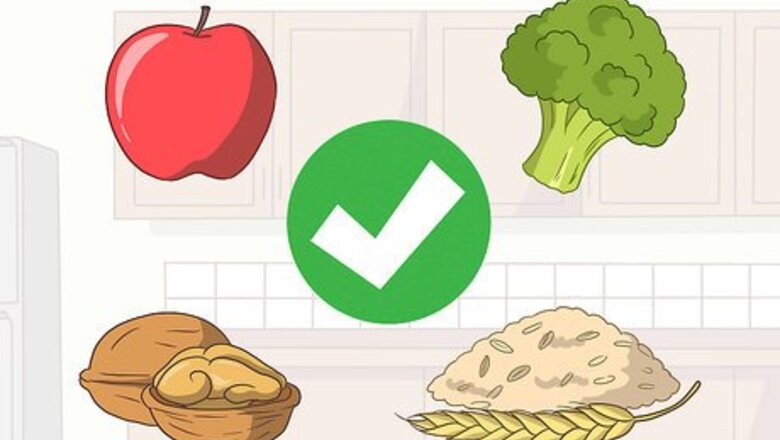
views
X
Trustworthy Source
PubMed Central
Journal archive from the U.S. National Institutes of Health
Go to source
Increasing Polyphenols in Your Diet
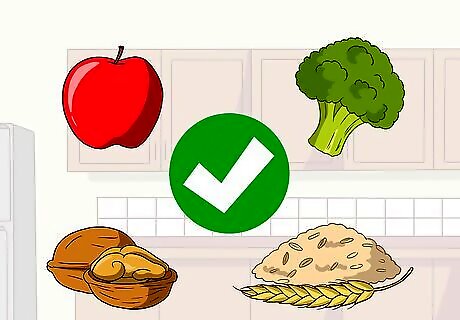
Eat a diet rich in fruits, vegetables, whole grains, and nuts. All plant-based foods contain polyphenols, a class of compounds that decreases your body’s activation of the protein complex NF-kB, which in turn reduces the production of pro-inflammatory cytokines. In short, then, eating a diet that is primarily plant-based can reduce chronic inflammation and your chances of developing numerous diseases. Try following an 80-20 rule, where you eat healthy 80% of the time, then limit treats to 20% of your diet. You don’t necessarily have to give up animal-based foods, but you should focus on lean proteins like fish and poultry and limit your intake of red meat and full-fat dairy products. Eating a wide range of plant-based foods every day gives you access to more of the many different types of polyphenols. This seems to be superior to focusing on consuming one specific type of polyphenol when it comes to reducing chronic inflammation.
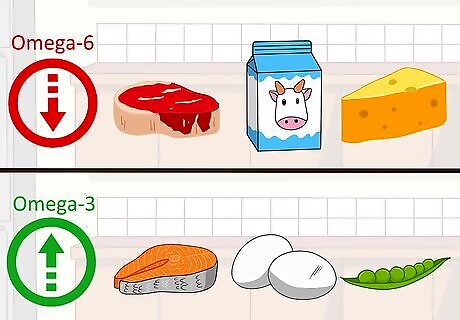
Increase your Omega-3 intake and reduce your Omega-6 intake. Omega-3 fatty acids aren’t technically polyphenols, but they have a similar impact on reducing your production of pro-inflammatory cytokines. Omega-6 fatty acids, on the other hand, have the opposite effect and should be largely avoided. Cold-water fish like salmon and albacore tuna are great sources of Omega-3. So are eggs, beans, flax, and canola oil, among other foods. You might also consider Omega-3 dietary supplements, but you should always consult your doctor first before starting on any type of supplement. Omega-6s are present primarily in red meat and dairy products.
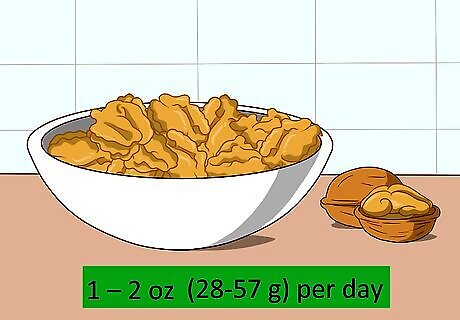
Consume 1–2 oz (28–57 g) of walnuts per day. Walnuts may be the closest thing to a single “superfood” for reducing pro-inflammatory cytokine levels. They contain several categories of polyphenols as well as Omega-3s, so eating at least 1 oz (28 g) of walnuts per day may provide a great boost to your cytokine-reduction goal. 1 oz (28 g) is considered a standard serving of walnuts, but eating 2 oz (57 g) per day may be even more beneficial. You can also use walnut oil in your cooking.
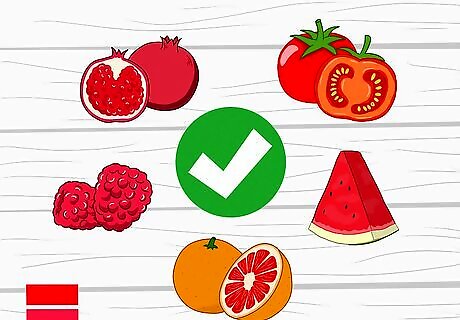
Eat fruits and vegetables with a red or pink color. The polyphenol lycopene gives fruits and veggies their red or pink color, so picking out plant-based foods in this color range is an easy way to reduce cytokines. Tomatoes are a great source of lycopene. Also try watermelon, pink grapefruit, red berries, and pomegranate.
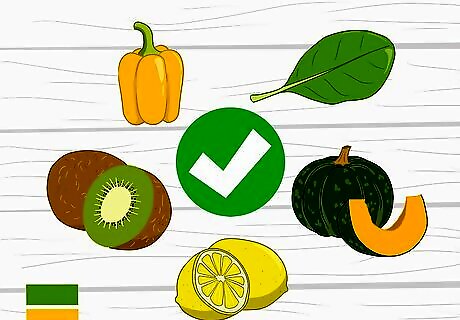
Seek out dark green and deep yellow fruits and veggies. The class of polyphenols called retinoids produces a green or yellow color in fruits and veggies. So, once again, you can eat by color and know you are getting anti-inflammatory benefits. Look for dark, leafy greens, squashes, and other green and yellow plant-based foods. Remember to pick from a range of colors to get a wider array of polyphenols. You could make a salad with spinach, sliced tomatoes, and chopped yellow bell peppers, for instance—and add a walnut-oil based dressing!
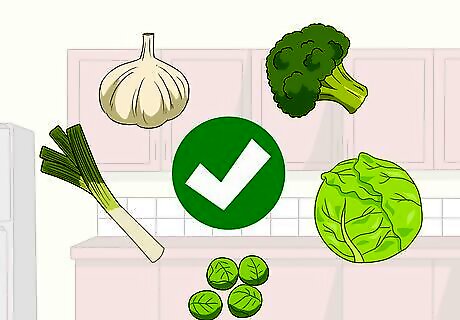
Load up on cruciferous veggies, onions, and garlic. These types of vegetables contain sulfur compounds that also fall into the polyphenols category. So, find ways to add them to your salads, sauces, and dressings, or as side dishes. Cruciferous veggies include broccoli, cauliflower, cabbage, and Brussels sprouts, among others. Leeks and green onions also contain these beneficial sulfur compounds.

Enjoy green tea, red wine, and dark chocolate. Green tea contains the category of polyphenols known as flavonoids, which makes it a great hot beverage choice. Red wine contains the polyphenol resveratrol, so having a glass per day may offer anti-inflammatory benefits. Drinking more than 1 or possibly 2 glasses of red wine per day is likely to have more negative than positive health effects, however. Moderate consumption of dark chocolate—1 oz (28 g) servings 3-4 times per week—might also provide you with the health benefits of polyphenols.
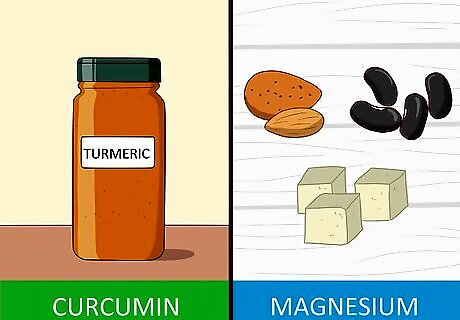
Increase the curcumin and magnesium in your diet. These are two more compounds that have shown evidence of potential cytokine-reduction properties. Curcumin is abundant in turmeric, the spice found in curry dishes and other foods. Magnesium can be found in spinach, almonds, black beans, and tofu, among other plant-based foods. If you are considering taking curcumin or magnesium supplements, talk to your doctor first.
Reducing Chronic Inflammation with Lifestyle Changes

Get at least 20 minutes of moderate exercise every day. The current general health guidance is that the average adult should get 150 minutes of moderate-activity exercise per week. However, within this 150-total, you should aim for exercise sessions that are at least 20 minutes long in order to receive anti-inflammatory benefits. Evidence indicates that a 20-minute session of moderate exercise is sufficient to start reducing “bad” cytokine levels. An exercise is considered “moderate” if you can still talk, but it is difficult to carry on a full conversation due to your heavier breathing.
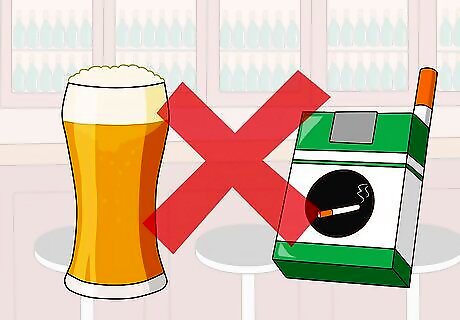
Stop smoking and manage your alcohol intake. Smoking increases chronic inflammation levels, among its many other negative health impacts. The same is true for excessive alcohol consumption. If you have more than 1 or possibly 2 drinks of red wine or other alcohol per day, the potential health benefits will be lost. If you don’t already consume alcohol, most experts don’t recommend that you start just to get the potential health benefits. If you are in the U.S., you can call the national Quit Line at 1-800-QUIT-NOW (1-800-784-8669) to get help quitting and connect you with resources in your area.

Reduce your stress levels through mind/body practices. If you are under constant stress, your body will produce more cytokines and therefore increase your chronic inflammation. This, in turn, can make you more susceptible to diabetes, heart disease, and cancer. Try mind/body practices like yoga, meditation, deep breathing, and visualization to reduce your stress levels. You may also find it beneficial to work with a licensed therapist in order to develop strategies to reduce your stress.
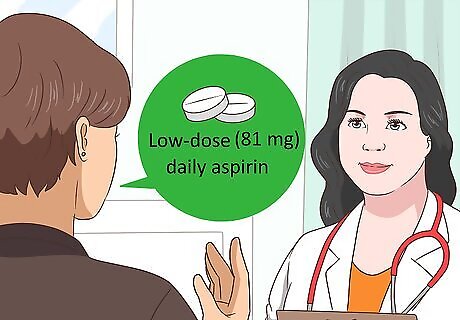
Talk to your doctor about aspirin therapy. Low-dose (often 81 mg) daily aspirin may reduce your risk of heart attack or stroke, and this benefit may be related in part to the possibility that aspirin may reduce the production of cytokines. Talk to your doctor about whether aspirin therapy is right for you. Do not start a daily aspirin regimen on your own—always talk to your doctor first. Aspirin can have serious side effects, including internal bleeding or allergic reactions. If you have high blood pressure or kidney problems, talk to your doctor about getting your GFR checked prior to taking aspirin. Nonsteroidal anti-inflammatory drugs (NSAIDs) such as these are generally not advised for people with these conditions.
















Comments
0 comment